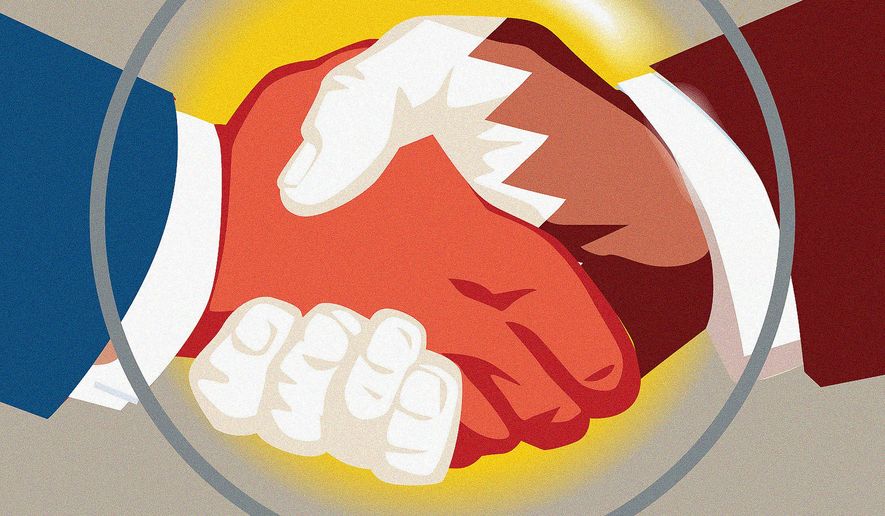OPINION:
Qatar regarded this year’s World Cup in Doha as a golden public relations opportunity to dazzle the world with its modern facilities, impressive economic development, and new status as a major political player on the world stage. To say the least, it did not work out according to plan.
Instead, the event highlighted the Qatari regime’s abysmal human rights record and the bribery and corruption it employed to host the 2022 World Cup in the first place.
Numerous journalists and attendees were detained for displaying LGBTQ support during the World Cup. Three Norwegian journalists were detained for reporting on the appalling abuses of migrant workers that Qatar imported to build the seven stadiums and overhaul the Qatari infrastructure in preparation for the World Cup.
Then, in a bombshell story just days ago, the Swiss newspaper SonntagsBlick confirmed what many had suspected at the time: The twin thug regimes of Russia and Qatar had worked together by means of espionage and bribery in 2010 to win rights to host the World Cup in 2018 and 2022 respectively. Ironically, the Qataris were also spying on the Russians to make sure they kept their word in the corrupt bargain to secure rights to the Cup. To aid this effort, Qatar engaged a then-active employee of the CIA — particularly egregious considering the United States was Qatar’s primary competitor in hosting the 2022 World Cup.
Using their vast wealth to play outside the ethical and legal guidelines is hardly unusual for Qatar, as was highlighted by yet another scandal that broke during the World Cup. In what one expert on transparency issues termed “the most shocking integrity scandal in the history of the EU,” European Parliament Vice President Eva Kaili and several other members were arrested by European Union authorities investigating what prosecutors termed a “criminal organization, corruption and money laundering” scheme conducted by the Qatari regime.
Among the group of EU Parliament members included in the raid warrant was the former human rights subcommittee chair Pier Antonio Panzeri, who was accused of “intervening politically with members working at the European Parliament for the benefit of Qatar and Morocco.” Qatar is accused of targeting officials “with a significant political and/or strategic position” at the Parliament, sending them “substantial amounts of money” and “important gifts,” according to the EU prosecutor.
Earlier this year, I introduced the Think Tank Transparency Act of 2022 (HR 8996, S 4987) along with Sen. Chuck Grassley, Iowa Republican, in response to Qatar’s aggressive, behind-the-scenes efforts to influence U.S. policy through donations to think tanks and other cutouts that failed to register as foreign agents as required by the Foreign Agents Registration Act (FARA). In June, the FBI launched an investigation of retired four-star Marine Corps Gen. John Allen’s purported efforts to influence U.S. foreign policy toward Qatar shortly before he was appointed president of the Brookings Institution. Its largest donor over the past 15 years has been Qatar.
Court filings indicate that Gen. Allen misrepresented his role in the lobbying campaign to officials of the U.S. government, failing to disclose that he was acting in accordance with what Qatar asked of him while also “simultaneously pursuing multimillion-dollar business deals with the government of Qatar.”
Another example of Qatari influence involves the Stimson Center, a nonprofit that deals with issues related to international security. Since 2020, the Stimson Center has actively lobbied congressional staff against the Homeland and Cyber Threat (HACT) Act (HR 1607), bipartisan legislation to curb foreign hacking activity against U.S. companies and citizens. The HACT Act passed in the House with broad bipartisan support in the last two Congresses through the National Defense Authorization bill, only to be stripped out in conference.
The Stimson Center has had an unusually close working relationship with Qatar in recent years. The Qataris appear to be the sole funder of the Stimson Center’s “Just Security 2020” program, whose stated mission includes working on issues related to cyberattacks. Stimson’s own literature acknowledges that its Qatar-funded program ($600K in 2019 alone) on cybersecurity is “built around three interconnected tracks of activity,” with the first being “policy dialogues and public policymaker engagement.” So it’s troubling that Stimson had been lobbying, without registering, to kill the legislation.
The authoritarian regime in Doha has spread its money around to cause foreign governments to turn a blind eye to their human rights abuses and their illegal foreign influence operations. It’s time for the Congress to let them know that this strategy will no longer work.
The United States should send a strong signal to the world that it does not endorse Qatar’s behavior by moving our Air Force base at Al Udeid Air Base in Doha out of the country. With many other viable options available in the region, it is unacceptable for the Pentagon to maintain the largest base in the region in a country that regularly abuses human rights and opposes U.S. interests, which gives Qatar unwarranted leverage over policymakers.
As the scandals swirling around the World Cup in Doha this year indicate, it’s long past time for a reset in U.S. policy toward the regime of Qatar.
• Jack Bergman is a retired Marine Corps lieutenant general and currently represents Michigan’s 1st Congressional District.




Please read our comment policy before commenting.